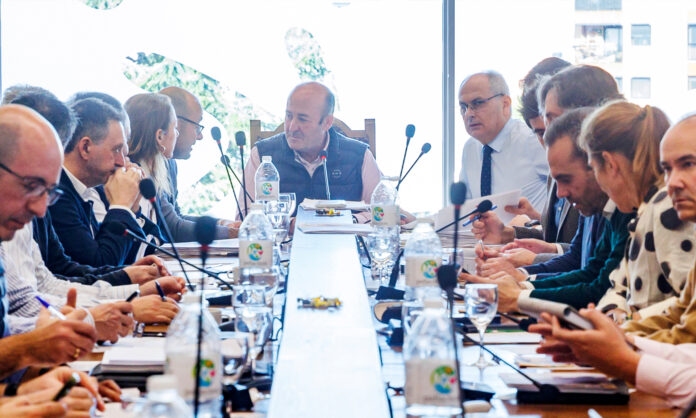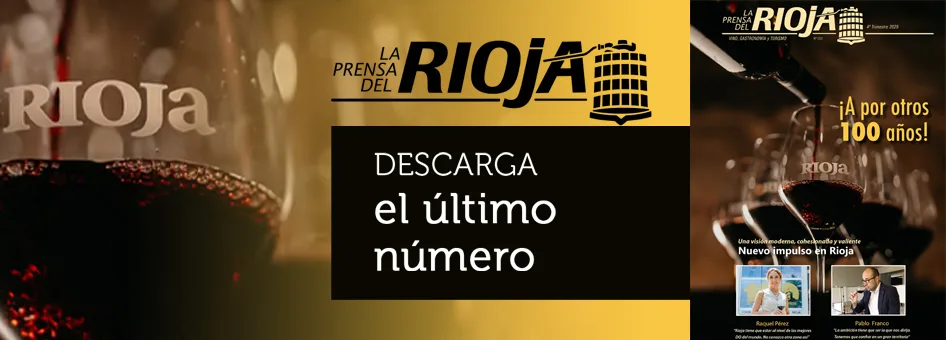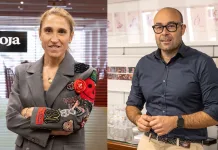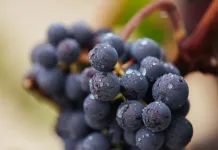
La representatividad de bodegas y viticultores se ajusta con mecanismos correctores tras una revisión de estatutos consensuada por unanimidad
Texto: Mirian Terroba
redaccion@laprensadelrioja.com
La Organización Interprofesional del Vino de Rioja (OIPVR) ha completado el proceso de acreditación para el mandato 2025-2029 con una participación récord, que ha permitido alcanzar un alto grado de representatividad entre las organizaciones del sector comercializador y productor de la Denominación de Origen Calificada (DOCa) Rioja. La Junta Directiva de la OIPVR ha entregado los certificados de adhesión acreditada y ha fijado oficialmente la nueva composición de sus órganos de gobierno, basándose en los criterios establecidos en los estatutos vigentes.
Mayor equidad en la distribución
Entre los aspectos más destacados del proceso de acreditación de este año figuran las modificaciones introducidas en los estatutos de la Organización Interprofesional del Vino de Rioja (OIPVR), aprobadas por unanimidad el pasado 10 de diciembre. Estas novedades incorporan mecanismos correctores en ambas ramas de representación, con el objetivo de reforzar el equilibrio institucional y adaptar el modelo de gobernanza a la realidad actual del sector.
En el caso de la rama comercializadora, se ha establecido por primera vez la posibilidad de aplicar un factor de corrección al alza en la representatividad de aquellas bodegas que puedan acreditar, mediante un certificado de auditoría, que su precio medio de comercialización es superior al doble del precio medio ponderado de las exportaciones calculado por el Consejo Regulador. Esta medida permite ajustar el peso relativo de las bodegas que comercializan sus vinos a un valor significativamente superior al promedio.
Por su parte, en la rama productora se han introducido dos medidas clave. En primer lugar, no se tendrán en cuenta las hectáreas de sociedades participadas en más de un 25 % por bodegas comercializadoras, con el fin de evitar que se solapen intereses y garantizar una representación independiente del sector productor. En segundo lugar, se ha habilitado la posibilidad de que las bodegas sin ventas en los últimos cuatro años puedan incorporar sus hectáreas al cómputo de representación del sector productor, lo que permite ampliar la base representativa de este colectivo.
Estas reformas tienen como finalidad garantizar una mayor equidad en la distribución de la representatividad y responder a los cambios estructurales que atraviesa el sector vitivinícola riojano.
Elevado nivel de acreditación
El procedimiento ha culminado con un elevado nivel de acreditación, alcanzando el 95,49 % de la superficie asociada a cooperativas, el 75,67 % de los viticultores no cooperativistas y el 79,14 % del total de la comercialización, lo que ha sido valorado de forma positiva por las organizaciones participantes.
La representación se distribuye en dos ramas con 16 vocales cada una. En la rama comercializadora, Grupo Rioja ha obtenido 90 votos y 13 vocales, seguido por la Agrupación de Bodegas por la Calidad (ABC) con 6 votos y 1 vocal; la Asociación de Bodegas de Rioja Alavesa (ABRA) con 2 votos y 1 vocal; y la Asociación ARAEX, también con 2 votos y 1 vocal.
En la rama productora, el sector de cooperativas queda compuesto por la Federación de Cooperativas de La Rioja (FECOAR), con 35 votos y 4 vocales; la Unión de Cooperativas de Navarra (UCAN), con 5 votos y 1 vocal; y Cooperativas de Rioja Alavesa (DOLARE), con 3 votos y 1 vocal. Por su parte, en el sector de organizaciones agrarias, ARAG-ASAJA logra 27 votos y 4 vocales; UAGA, 11 votos y 2 vocales; UAGR, 9 votos y 2 vocales; UPA, 5 votos y 1 vocal; y UAGN, 5 votos y 1 vocal.
Las adhesiones se presentaron el pasado 30 de abril, con la participación como observadores de Henar Moreno, Luis Ruiz-Salinas, Igor Fonseca y Norberto Miguel Aguillo. La asignación de votos y vocales se ha realizado conforme a los criterios estatutarios del Consejo Regulador.
La elección de cargos directivos, incluido el presidente de la OIPVR, se celebrará el próximo 24 de junio, fecha en la que también se constituirá el nuevo pleno del Consejo Regulador.
Grupo Rioja lidera el sector comercializador
Las reacciones del sector no se han hecho esperar. Por ejemplo, Grupo Rioja -que ha reforzado su representatividad en la Organización Interprofesional del Vino de Rioja (OIPVR) y el Consejo Regulador de la DOCa Rioja, tras obtener 90 votos en la rama comercial y 13 vocales en los órganos de gobierno- atribuye este respaldo a su “compromiso con el futuro del sector y al liderazgo ejercido en iniciativas clave para afrontar los desafíos actuales del vino de Rioja”. Entre ellas, destacan la protección del paisaje, la defensa de los viñedos viejos y la revisión de menciones diferenciadoras como los Vinos de Pueblo.
Grupo Rioja ha celebrado también la continuidad de todas las asociaciones bodegueras participantes, lo que refuerza la diversidad de voces en la gobernanza de la DOCa, una singularidad dentro del panorama vitivinícola español. La entidad ha subrayado la importancia del consenso en la toma de decisiones dentro de la Interprofesional, donde se exige un mínimo del 75 % de votos favorables para adoptar acuerdos, y ha reafirmado su voluntad de seguir trabajando por la rentabilidad y sostenibilidad del conjunto del sector.
Según el Grupo, “esto consolida a Rioja como la región vitivinícola española con mayor diversidad de asociaciones representadas, ya que en el resto de zonas sólo existe una única asociación bodeguera y la concurrencia de diferentes asociaciones aporta, sin duda, una visión más enriquecedora en los debates sobre el futuro de nuestro sector”.
En ese sentido, felicita “a todas las asociaciones por la renovación de su representatividad, tanto de la rama comercial como de la productora, y emplazarles a continuar con el intenso trabajo que se está desarrollando desde el Consejo Regulador y la Interprofesional del Vino de Rioja para superar una coyuntura complicada y recuperar cuanto antes la rentabilidad de todo el sector”.
Cambio de equilibrio en el sector productor
ARAG-ASAJA se consolida una vez más como la organización profesional agraria con mayor representatividad en el Consejo Regulador de la DOCa Rioja para el próximo mandato 2025-2029. Ha logrado acreditar 11.972 hectáreas, lo que representa un 28,34 % de la superficie correspondiente al sector productor de viticultores no cooperativistas, más del doble que la siguiente organización en representatividad.
Sumando las hectáreas acreditadas junto a UAGN, ambas entidades alcanzan casi 14.000 hectáreas, lo que supone más del 30 % de la superficie productora de la denominación. En concreto, ARAG-ASAJA ha obtenido 27 votos y contará con 4 vocales en la Junta Directiva y el Pleno del Consejo Regulador, desde donde continuará defendiendo los intereses del viñedo y promoviendo medidas orientadas a mejorar la rentabilidad del sector y recuperar el equilibrio en la DOCa Rioja.
Por su parte, UAGR-COAG y UAGA han mejorado su representatividad, pasando de uno a dos vocales cada una en la Junta Directiva de la Interprofesional y en el Pleno del Consejo Regulador. En concreto, UAGR alcanza por primera vez el 16 % de representatividad, mientras que UAGA se sitúa en el 19,72 % entre los viticultores alaveses.
Esta reconfiguración resta peso a ARAG-Asaja, que pierde uno de sus vocales. Desde UAGR-COAG interpretan estos resultados como la confirmación de que el sector “quiere cambiar el Rioja, variando su rumbo, un cambio que hubiera
sido mucho mayor de no ser por el viciado sistema con el que los grandes
grupos se aseguran el control de la DOC en ambos sectores”. La UAGR recuerda
en este punto sus críticas a un proceso «viciado, oscuro y manipulado, ya
que no se permite el voto secreto, los viticultores socios de cooperativas
no pueden votar y la representatividad económica para una entidad privada,
como es la Interprofesional, se traslada directamente a un ente público,
como es el Consejo Regulador”.
Abstención de las bodegas familiares
La asociación Bodegas Familiares de Rioja, que ya había anunciado que no formaría parte del proceso y promovió activamente el ‘no voto’, ha denunciado una profunda desconexión entre el Consejo Regulador y las pequeñas bodegas, tras conocerse que dos de cada tres no han participado en el proceso electoral. “Únicamente 170 bodegas han delegado su representación a las organizaciones del pleno, cuando hace cuatro años fueron 410 las que lo hicieron, es decir, prácticamente el 75% del total”, lo que la entidad considera una muestra del malestar del sector familiar. Además, critican la falta de transparencia en los datos oficiales, asegurando que el 79 % de participación anunciado se refiere al volumen de vino comercializado, no al número real de empresas votantes.












